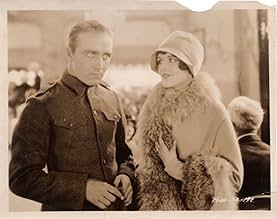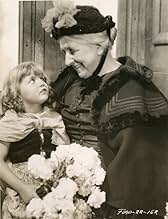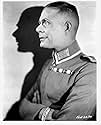Agrega una trama en tu idiomaA family saga in which three sons of a Bavarian widow go to war for Germany and the fourth goes to America, Germany's eventual opponent.A family saga in which three sons of a Bavarian widow go to war for Germany and the fourth goes to America, Germany's eventual opponent.A family saga in which three sons of a Bavarian widow go to war for Germany and the fourth goes to America, Germany's eventual opponent.
- Dirección
- Guionistas
- Elenco
- Premios
- 3 premios ganados en total
Frank Baker
- Soldier
- (sin créditos)
George Blagoi
- Officer
- (sin créditos)
Stanley Blystone
- Officer
- (sin créditos)
Carl Boheme
- Officer
- (sin créditos)
Constant Franke
- Officer
- (sin créditos)
Opiniones destacadas
Sentimental, but not mawkish, the early John Ford silent, "Four Sons," is a well made film that exemplifies early 20th century values. The four sons of a Bavarian widow are swept up in the events of World War I. Three of the boys fight for the Kaiser, while the fourth, who had emigrated to the United States, is on the opposite side. The screenplay does not dwell on politics, although the German officers have villainous characters, and the American son chastises an employee for advocating war, because "America is neutral." Most of the action takes place in a small village in Bavaria, and the unspoken message is that ordinary Germans are as kind and feeling as people everywhere.
Despite a predictable storyline, the performances avoid the "grand style" that gave silent acting a bad name. Made in 1928 at the apogee of the American silent era, John Ford's direction is solid, and the film foreshadows his adaptation of "How Green Was My Valley" more than a decade later. Certainly the two strong mothers who suffer the absence of their sons have much in common. If John Ford had not directed "Four Sons," the film could have been largely forgotten. Plot holes abound, and coincidences occur that "only happen in the movies." However, the film is a good example of popular entertainment in the late silent era, and modern audiences will likely be engaged, especially students of Ford and those with an affection for silent movies.
Despite a predictable storyline, the performances avoid the "grand style" that gave silent acting a bad name. Made in 1928 at the apogee of the American silent era, John Ford's direction is solid, and the film foreshadows his adaptation of "How Green Was My Valley" more than a decade later. Certainly the two strong mothers who suffer the absence of their sons have much in common. If John Ford had not directed "Four Sons," the film could have been largely forgotten. Plot holes abound, and coincidences occur that "only happen in the movies." However, the film is a good example of popular entertainment in the late silent era, and modern audiences will likely be engaged, especially students of Ford and those with an affection for silent movies.
10finki
This classic John Ford masterpiece has been spoiled by bureaucratic incompentece.
Somebody in 20th Century-Fox has decided to remove the original Movietone soundtrack and replace it with an inappropriate score. it seems that for certain people, the original intentions of director John Ford were no good enough for today. Hence, the film was stripped of its sound... which means that we do not have the film as it was originally intended to be seen.
Even though in most parts of the world, as well here in the United States, most people saw the film in a silent version, the original soundtrack is a crucial element of the film and without it, the experience is incomplete.
A great film, but avoid the DVD until an authentic restored version with the original soundtrack becomes available.
Somebody in 20th Century-Fox has decided to remove the original Movietone soundtrack and replace it with an inappropriate score. it seems that for certain people, the original intentions of director John Ford were no good enough for today. Hence, the film was stripped of its sound... which means that we do not have the film as it was originally intended to be seen.
Even though in most parts of the world, as well here in the United States, most people saw the film in a silent version, the original soundtrack is a crucial element of the film and without it, the experience is incomplete.
A great film, but avoid the DVD until an authentic restored version with the original soundtrack becomes available.
In Germany, at the dawn of World War I, widow Margaret Mann (as Frau Bernle) is blessed with "Four Sons" - strapping soldier Francis X. Bushman Jr. (as Franz), dreamy rustic James Hall (as Joseph), handsome metalworker Charles Morton (as Johann), and fair-haired shepherd George Meeker (as Andreas). And, she makes the best honey-cakes in Bavaria. With one son serving the Fatherland, and two more about to join him on the battlefield, Ms. Mann arranges for adventurous Mr. Hall to emigrate to democratic America. There, he opens a delicatessen and marries sweet, beautiful June Collyer (as Annabelle). Eventually, the Great War results in multiple brother tragedies, testing old mother Mann's ability to count her blessings.
The last years of the "silent film" era produced an avalanche of stunning motion pictures; in hindsight, you wonder if the "talkie" might have prevented the silent from advancing even beyond its late 1920s peak. "Four Sons" is another artful example, with John Ford and his picturesque cameramen, George Schneiderman and Charles C. Clarke, directing under the influence of F.W. Murnau - the combination produced a winning film, full of memorable scenes and images. Ford's best symbolic double whammy has two white birds flying to heaven, followed by postman Albert Gran hurling stoning the church's reflection. The restored print looks lovely, but lacks the original's innovative "synchronized sound effects" track, which will hopefully turn up somewhere.
The film won the "Best Picture" of 1928 medal from "Photoplay" and placed #4 on the annual "Film Daily" honor roll.
********* Four Sons (2/13/28) John Ford ~ Margaret Mann, James Hall, George Meeker, Charles Morton
The last years of the "silent film" era produced an avalanche of stunning motion pictures; in hindsight, you wonder if the "talkie" might have prevented the silent from advancing even beyond its late 1920s peak. "Four Sons" is another artful example, with John Ford and his picturesque cameramen, George Schneiderman and Charles C. Clarke, directing under the influence of F.W. Murnau - the combination produced a winning film, full of memorable scenes and images. Ford's best symbolic double whammy has two white birds flying to heaven, followed by postman Albert Gran hurling stoning the church's reflection. The restored print looks lovely, but lacks the original's innovative "synchronized sound effects" track, which will hopefully turn up somewhere.
The film won the "Best Picture" of 1928 medal from "Photoplay" and placed #4 on the annual "Film Daily" honor roll.
********* Four Sons (2/13/28) John Ford ~ Margaret Mann, James Hall, George Meeker, Charles Morton
By chance I wound up watching this wonderfully beautifully crafted film on all counts this evening on Turner. The film work is masterfully done with John Ford's usual care and sensitivity to his audience. Mary Mann is outstanding as the mother of her ever faithful sons who go to war. Many will remember her right away as the sweet Grandma in The Little Rascals "Go fly a Kite" and proves what a powerful performer she was and it's a pity she was not given more opportunities.
James Hall who plays Joseph who goes to America to seek his fortune is a real find and I would like to know more about him. Handsome and quite charming and it's puzzling why he was not utilized in his career as well. A silent film that would be a nice introduction to anyone who has been hesitant about watching this lost art form. Worth the time and love to own this if it ever comes out in DVD.
James Hall who plays Joseph who goes to America to seek his fortune is a real find and I would like to know more about him. Handsome and quite charming and it's puzzling why he was not utilized in his career as well. A silent film that would be a nice introduction to anyone who has been hesitant about watching this lost art form. Worth the time and love to own this if it ever comes out in DVD.
Other than The Iron Horse we rarely see John Ford's silent films. But in viewing Four Sons we can certainly spot a lot of stylistic traces and themes that mark Ford's more well known sound films.
Before The Iron Horse Ford was a director of Grade B westerns mostly starring Harry Carey. After The Iron Horse Ford started doing other kinds of films. A story with a German setting one might think would be unusual for Ford, but you examine it closely this film is as sentimental as any of his Irish films. And Margaret Mann who played the mother of the Four Sons was a harbinger of such later mother characters in Ford films as Olive Carey, Irene Rich, and the grandmama of them all, Jane Darwell.
Watch also how Ford handles the military sequences in both the German and American settings. The cultural differences are there, but the military way is universal. John Wayne is listed in a bit role as an Officer and I think I spotted him during a scene at a railway station where a particularly nasty Teutonic major played by Earle Foxe. Wayne I believe is one of his aides.
The story is a simple one Margaret Mann is a widow with four grown sons in a village in Bavaria. The sons are James Hall, Charles Morton, Ralph Bushman, and George Meeker. Hall has been in communication with a friend in America urging him to emigrate from Germany and he does. Hall does achieve the American dream, opening a successful business, marrying June Collyer and giving Mann her first grandchild. Then World War I comes and that's the rest of the story as Paul Harvey used to say.
Four Sons holds up well even after 80+ years. Mann's trials and tribulations as a mother certainly is a universal theme. And the ending is as happy and sentimental one as John Ford ever devised in any of his films.
Before The Iron Horse Ford was a director of Grade B westerns mostly starring Harry Carey. After The Iron Horse Ford started doing other kinds of films. A story with a German setting one might think would be unusual for Ford, but you examine it closely this film is as sentimental as any of his Irish films. And Margaret Mann who played the mother of the Four Sons was a harbinger of such later mother characters in Ford films as Olive Carey, Irene Rich, and the grandmama of them all, Jane Darwell.
Watch also how Ford handles the military sequences in both the German and American settings. The cultural differences are there, but the military way is universal. John Wayne is listed in a bit role as an Officer and I think I spotted him during a scene at a railway station where a particularly nasty Teutonic major played by Earle Foxe. Wayne I believe is one of his aides.
The story is a simple one Margaret Mann is a widow with four grown sons in a village in Bavaria. The sons are James Hall, Charles Morton, Ralph Bushman, and George Meeker. Hall has been in communication with a friend in America urging him to emigrate from Germany and he does. Hall does achieve the American dream, opening a successful business, marrying June Collyer and giving Mann her first grandchild. Then World War I comes and that's the rest of the story as Paul Harvey used to say.
Four Sons holds up well even after 80+ years. Mann's trials and tribulations as a mother certainly is a universal theme. And the ending is as happy and sentimental one as John Ford ever devised in any of his films.
¿Sabías que…?
- TriviaThe film set a permanent attendance record at New York's Roxy Theater
- ErroresIn the New York City sequences, which take place immediately after World War I (1919-1920), all of the women's fashions are strictly in the style of 1928, and all of the automobiles are of late-1920s design.
- Citas
The Schoolmaster: Books, Herr Postman, are friends that never deceive,
- ConexionesFeatured in Hollywood (1980)
- Bandas sonorasLittle Mother
(1928) (uncredited)
Music by Erno Rapee
Lyrics by Lew Pollack
Sung by Harold Van Duzee and the Roxy Male Quartette
Selecciones populares
Inicia sesión para calificar y agrega a la lista de videos para obtener recomendaciones personalizadas
Detalles
- Fecha de lanzamiento
- País de origen
- Idioma
- También se conoce como
- Cetiri sina
- Locaciones de filmación
- Productora
- Ver más créditos de la compañía en IMDbPro
Taquilla
- Total en EE. UU. y Canadá
- USD 3,270,000
- Tiempo de ejecución1 hora 40 minutos
Contribuir a esta página
Sugiere una edición o agrega el contenido que falta



































